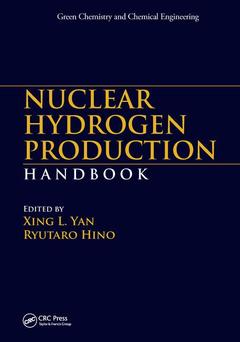Nuclear Hydrogen Production Handbook Green Chemistry and Chemical Engineering Series
Coordonnateurs : Yan Xing L., Hino Ryutaro

Written by two leading researchers from the world-renowned Japan Atomic Energy Agency, the Nuclear Hydrogen Production Handbook is an unrivalled overview of current and future prospects for the effective production of hydrogen via nuclear energy. Combining information from scholarly analyses, industrial data, references, and other resources, this handbook illustrates hydrogen?s versatility and potential both as a sustainable energy carrier (e.g., fuel for vehicles and power generators) and as a feedstock material for industry (agriculture, oil, chemical, and steel, etc.).
Packed with details about the science, engineering, and production involved in nuclear hydrogen generation, this handbook presents case studies that delve into:
- Research results of hydrogen development programs sponsored by Japan, Argentina, China, Korea, the US and the EU, among others
- Operational developments at major nuclear reactors
- Cutting-edge hydrogen production systems and methods, including high-temperature electrolysis of steam and biomass gasification
- Applications such as heat- and corrosion-resistant construction materials, chemical reactors, and heat exchangers, as well as thermochemical iodine-sulfur processes
- Integrated process designs (including thermochemical and hybrid methods)
- Nuclear hydrogen plant operation management and safety
Far exceeding the limited introductory detail offered in other books on the topic, this reference offers an all-encompassing international perspective on nuclear hydrogen production. Addressing a wide range of pertinent technologies, scientific trends, and technical details, this resource will be a useful tool for readers at all levels of understanding.
Section I: Hydrogen and Its Production from Nuclear EnergyThe Role of Hydrogen in the World Economy. Nuclear Hydrogen Production: An Overview.
Section II: Hydrogen Production MethodsWater Electrolysis. Steam Electrolysis. Thermochemical Decomposition of Water. Conversion of Hydrocarbons. Biomass Method. Radiolysis of Water.
Section III: Nuclear Hydrogen Production SystemsWater Reactor. High-Temperature Gas Reactor. Sodium Fast Reactor. Gas Fast Reactor. Fluoride Salt Advanced High-Temperature Reactor. STAR-H2: A Pb-Cooled, Long Refueling Interval Reactor. Fusion Reactor Hydrogen Production.
Section IV: Applied Science and TechnologyHigh-Temperature Electrolysis of Steam. Thermochemical Iodine–Sulfur Process. The Hybrid Sulfur Cycle. Nuclear Coal Gasification. Nuclear Steam Reforming of Methane. Hydrogen Plant Construction and Process Materials. Nuclear Hydrogen Production Process Reactors. Nuclear Hydrogen Production Plant Safety. Nuclear Hydrogen Plant Operations and Products. Licensing Framework for Nuclear Hydrogen Production Plant.
Section V: Worldwide Research and DevelopmentHydrogen Production and Applications Program in Argentina. Nuclear Hydrogen Production Development in China. European Union Activities on Using Nuclear Power for Hydrogen Production. HTTR-IS Nuclear Hydrogen Demonstration Program in Japan. Nuclear Hydrogen Project in Korea. NGNP and NHI Programs of the U.S. Department of Energy. International Development of Fusion Energy.
Section VI: AppendicesChemical, Thermodynamic, and Transport Properties of Pure Compounds and Solutions. Thermodynamic and Transport Properties of Coolants for Nuclear Reactors Considered for Hydrogen Production.
Xing L. Yan and Ryutaro Hino both work for the Japan Atomic Energy Agency.
Yan received his Ph.D from the Massachusetts Institute of Technology. He participated in the United States Department of Energy’s development program on the modular high-temperature gas-cooled reactor and contributed to the Energy Research Center of the Netherlands’ program for small high-temperature reactor cogeneration plant designs. At the JAEA, he has led the technical design and technology development for a commercial series of nuclear hydrogen production systems.
Hino received his Ph.D from the University of Tokyo. He is the only researcher at the JAEA who has experience in all three leading nuclear hydrogen production methods under worldwide development: steam reforming of methane, high-temperature electrolysis, and thermochemical water splitting. He was awarded the 2007 Prize of the Atomic Energy Society of Japan for his contribution to the successful development of new ceramic heat exchangers used for high-temperature thermochemical hydrogen production.
Date de parution : 04-2018
17.8x25.4 cm
Date de parution : 05-2011
Ouvrage de 940 p.
17.8x25.4 cm
Thèmes de Nuclear Hydrogen Production Handbook :
Mots-clés :
Hydrogen Production; systems; Bunsen Reactor; steam; Nuclear Hydrogen Production; reforming; Steam Reforming; bunsen; HTTR; reaction; Nuclear Hydrogen; high; Generation Iv; temp; Hydrogen Production Plant; electrolysis; Hydrogen Production System; generator; Energy Sources; rate; Thermochemical Cycles; Fuel Cell; Coated Particle Fuel; Steam Reformer; Hydrogen Production Rate; SFR; Mol H2; Hydrogen Plant; Helium Gas; SMR; PEM Fuel Cell; Nuclear Process Heat; Catalyst Tube; Sulfuric Acid Decomposition; Fuel Assembly



